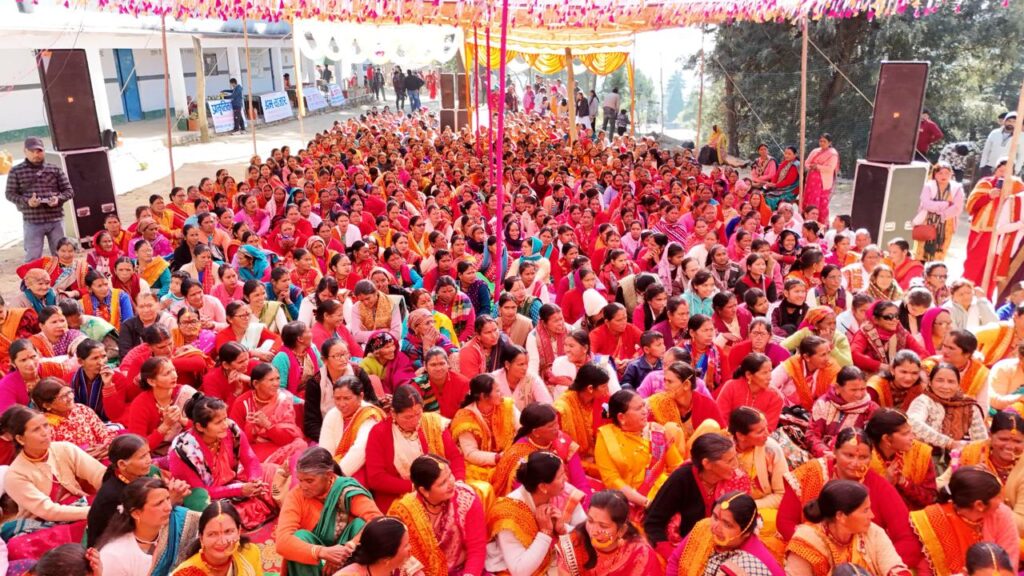Posters with the picture of a young woman wearing a faint smile, and her educational qualifications highlighted in bold red, are plastered across the village of Jheepa in Uttarakhand’s Almora district. Though at first glance it looks like any other poster, the message behind the absence of a man in the frame is not lost on anyone.
Sunita Devi, 32, is vying to become the gram pradhan of Jheepa, which votes in the second phase of the panchayat elections on July 28. She is the president of a women’s group called the Rachnatmak Mahila Manch that has thrown its hat in the ring for the first time since its inception in 2013, pledging to abolish the practice of “pradhan pati (husbands of elected women officials running the show as their proxies)”.
The decision to take the electoral plunge was taken at a cluster-level leader meeting of the nine “shram sakhis” — heads of the 11 clusters falling under the group — on Panchayati Raj Diwas on April 24, following which candidate selection was conducted in village-level meetings.
Based in the Salt block of Almora and not yet registered as a political party, the Manch has 26 members contesting elections for the post of gram pradhan, six for block development councils, and one for zila panchayat president. Apart from this, the organisation has also extended support to 40 non-member candidates.
Starting as a group with 150 women from 11 villages, the Manch now boasts of running operations in 150 villages of Almora and Pauri Garhwal, with over 1,500 members. An offshoot of the not-for-profit organisation Shramyog, the Manch, which charges its members a Rs 5 annual subscription to fund its activities, has spearheaded protests to demand higher compensation for victims of human-animal conflict, better MGNREGA wages, and better healthcare insurance. It has also helped women set up food processing units and connect their produce to markets.
“Almora saw a negative decadal growth rate due to migration in the 2011 Census. This prompted us to set up an institution to focus on the social capital of the region. Over the years, communal polarisation, unemployment, and alcohol consumption have risen across the state. Our group, comprising unions of ASHA workers, anganwadi workers, farmers, and women, hopes to instil a sense of community in the region and fight against these issues,” says Shankar Datt, one of Shramyog’s founding members.
Even as it lends voice to various causes, running the group is a challenging task for its members who meet each November, the only winter month when the women in the region are relatively less occupied as they do not have to work in the fields. “We meet and discuss activities undertaken through the year, set targets for the following year and review our performance on the path to independence,” says Renuka, who joined the group in 2020.
Aiming to build educated villages free of exploitation, safe for children and women, and based on the principle of social justice, the Manch’s manifesto — it is called “Humari gram sabha, humara raj, panchayaton se karwayenge sare kaaj (Our gram sabha, our rule – all work will be done through panchayats)” — promises to foster the spirit of community and abolish the practice of “pradhan pati”.
“We will not offer money and alcohol to voters and also won’t arrange vehicles to ferry them. We will encourage only permanent residents of the village to contest the polls, while every family will be involved in the development, decisions regarding which would be taken in the gram sabha,” reads the manifesto. Some of the Manch’s other promises include planting and protecting one tree for every girl child born in the village, transparency in panchayat accounts and records, and accountability of government officials and employees.
Devi, who unsuccessfully contested the 2019 panchayat polls at the block-level, says women will be in charge of self-governance and decision-making if the Manch wins. “We barely attend gram panchayat meetings as it is monopolised by men. However, this time there is a difference as women candidates have started to showcase their identity,” she says.
With two of its members already elected unopposed as village heads, a section of the group alleges they have been “hounded” by BJP workers. The Salt block has 138 gram pradhan posts, 40 development council seats, and five zila panchayat seats up for grabs. The results will be declared on July 31.
The group’s actions are seemingly resonating in surrounding areas of Jheepa. “The Manch helped receive a compensation of Rs 6 lakh for the family of a man who was killed in a leopard attack by protesting and writing to the authorities. It has also worked in the van (forest) panchayats of the area. The group has made its presence felt over the years and could win a fair number of seats,” says Narayan Barthwal of Gingrai village, which is around 13 kilometres from Jheepa.
However, BJP mandal president Sujeet Singh Chaudhary is confident of a “comfortable victory” and says his party does not endorse the practice of “pradhan pati”. “We have fielded educated women who can lead villages well,” he says.

